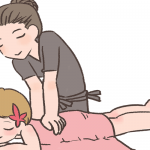Have you been experiencing pain and stiffness in the muscles around your jaw? Do you find it difficult to open and close your mouth when eating or talking? Well, if you have answered yes to these questions, then there is a high chance that you are experiencing temporomandibular joint pain. Often confused for ear infections, TMJ pain can manifest itself through headaches, dizziness, neck pain, tinnitus (ringing sound in your ear), jaw popping sounds and even having a misaligned bite among other signs and symptoms. Understanding the cause of your TMJ pain will assist in identifying the best treatment option that will eradicate the problem once and for all. Here are 5 surprising causes you probably didn’t know:
- Stress
Do you often find yourself grinding your teeth when you’re nervous? Or are you always looking for a stick of gum to chew on during the day? Chronic jaw clenching as a result of stress can easily lead to TMJ pain disorder. This is due to the fact that when you clench your jaw and grind your teeth, you are exerting unnecessary pressure on your temporomandibular joint. Overtime, this overexertion can lead to pain and jaw fatigue.
- Dental problems
Your teeth play a critical role in ensuring the smooth execution of jaw movements. Since your jaw moves up and down and side to side when chewing, misaligned teeth can place a lot of stress on your temporomandibular joint, thereby resulting in pain and difficulty when eating.
- Infections
Tetanus is a serious bacterial infection commonly referred to as ‘lock jaw’ due to the muscle spasms it causes in the muscles surrounding the jaw. If you suspect that you have been exposed to the tetanus toxin through untreated wounds or crush injuries, then jaw stiffness could be an indication of infection.
- Arthritis
When most people think of arthritis, they immediately associate it with pain in the joints of the arms and legs. While it is true that most people primarily experience arthritic pain in the limbs, arthritis can attack any joint in the body. Hence, if you are experiencing TMJ pain disorder, be sure to ask yourself whether other joints in the body have been affected in order to determine whether arthritis could be the culprit.
- Head and neck injuries
Many people are unaware of the extensive connectivity that exists among the structures of the head and neck. An injury in one area can manifest itself in several ways. For example, a whiplash injury can lead to TMJ pain disorder long after the accident itself happened.
In order to be certain about the cause of your TMJ pain, it is advisable for you to visit a qualified physical therapist who will do a thorough evaluation and thereafter develop an effective treatment plan that will assist you in recovery. So don’t struggle alone; visit a specialist today to get the right solution to your problem.







